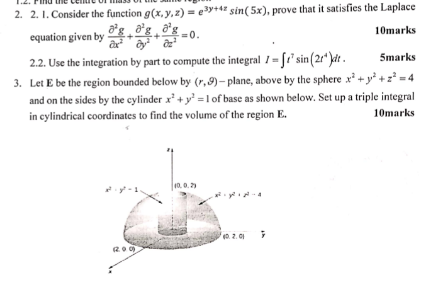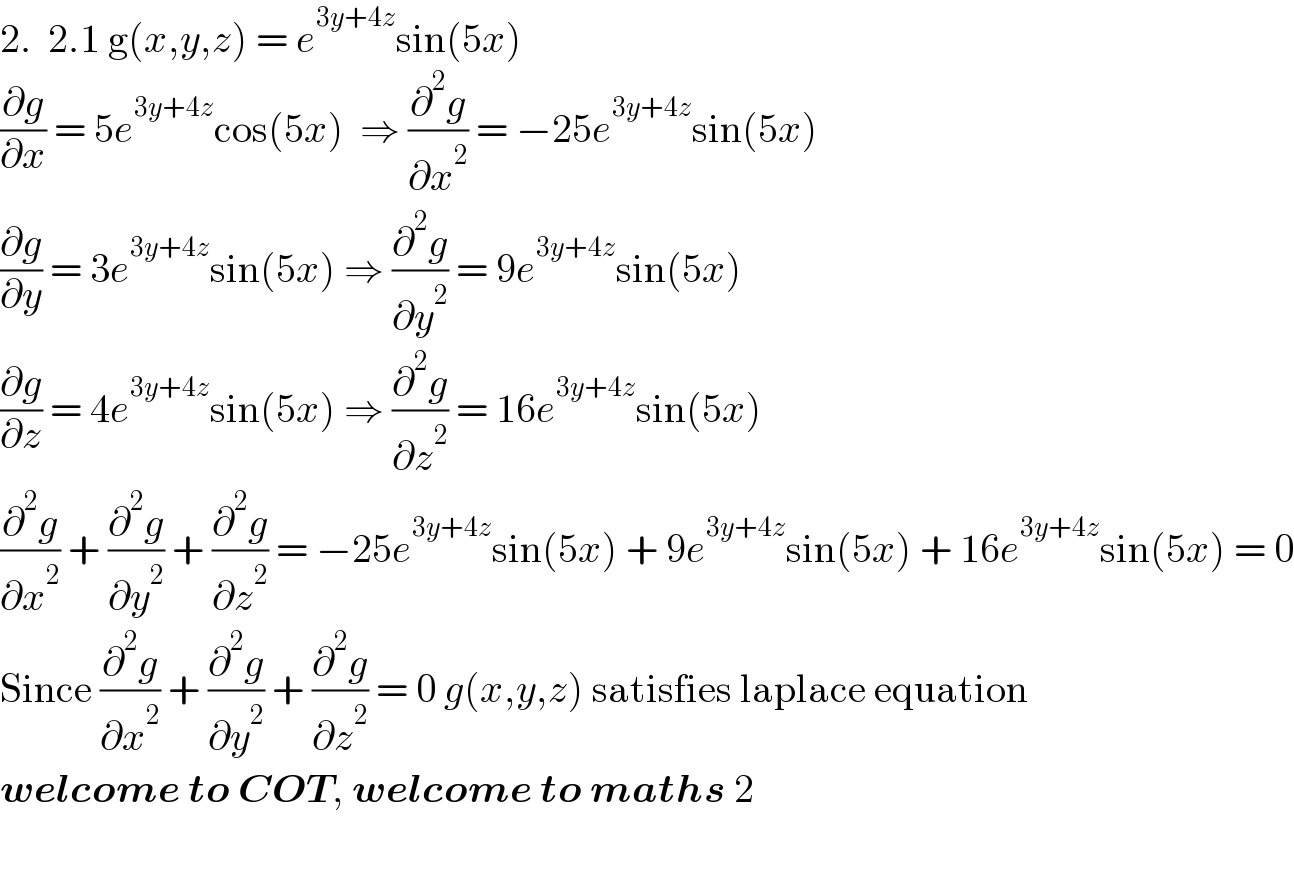
Question Number 190927 by alcohol last updated on 14/Apr/23

Answered by MikeH last updated on 15/Apr/23
![I = ∫t^7 sin(2t^4 )dt let u =2 t^4 ⇒ du = 8t^3 dt ⇒ dt = (du/(8t^3 )) ⇒ I = ∫t^7 sin(u)(du/(8t^3 )) = (1/8)∫t^4 sin(u)du I = (1/(16))∫usin udu by parts { ((a = u ⇒ a′ = 1)),((b′ = sin u⇒b = −cos u)) :} I = −(1/(16))[−ucos u + ∫cos u du] I = −(1/(16))(−ucos u + sin u) + k I = −(1/(16)) (−2t^4 cos (2t^4 ) + sin (2t^4 )) + k welcome again to COT and maths 2 hehe](Q190980.png)
$${I}\:=\:\int{t}^{\mathrm{7}} \mathrm{sin}\left(\mathrm{2}{t}^{\mathrm{4}} \right){dt} \\ $$$$\mathrm{let}\:{u}\:=\mathrm{2}\:{t}^{\mathrm{4}} \:\Rightarrow\:{du}\:=\:\mathrm{8}{t}^{\mathrm{3}} {dt}\:\:\Rightarrow\:{dt}\:=\:\frac{{du}}{\mathrm{8}{t}^{\mathrm{3}} } \\ $$$$\Rightarrow\:{I}\:=\:\int{t}^{\mathrm{7}} \mathrm{sin}\left({u}\right)\frac{{du}}{\mathrm{8}{t}^{\mathrm{3}} }\:=\:\frac{\mathrm{1}}{\mathrm{8}}\int{t}^{\mathrm{4}} \mathrm{sin}\left({u}\right){du} \\ $$$${I}\:=\:\frac{\mathrm{1}}{\mathrm{16}}\int{u}\mathrm{sin}\:{udu} \\ $$$$\mathrm{by}\:\mathrm{parts}\:\:\begin{cases}{{a}\:=\:{u}\:\Rightarrow\:{a}'\:=\:\mathrm{1}}\\{{b}'\:=\:\mathrm{sin}\:{u}\Rightarrow{b}\:=\:−\mathrm{cos}\:{u}}\end{cases} \\ $$$${I}\:=\:−\frac{\mathrm{1}}{\mathrm{16}}\left[−{u}\mathrm{cos}\:{u}\:+\:\int\mathrm{cos}\:{u}\:{du}\right] \\ $$$${I}\:=\:−\frac{\mathrm{1}}{\mathrm{16}}\left(−{u}\mathrm{cos}\:{u}\:+\:\mathrm{sin}\:{u}\right)\:+\:{k} \\ $$$${I}\:=\:−\frac{\mathrm{1}}{\mathrm{16}}\:\left(−\mathrm{2}{t}^{\mathrm{4}} \mathrm{cos}\:\left(\mathrm{2}{t}^{\mathrm{4}} \right)\:+\:\mathrm{sin}\:\left(\mathrm{2}{t}^{\mathrm{4}} \right)\right)\:+\:{k} \\ $$$$\boldsymbol{\mathrm{welcome}}\:\boldsymbol{\mathrm{again}}\:\boldsymbol{\mathrm{to}}\:\boldsymbol{\mathrm{COT}}\:\boldsymbol{\mathrm{and}}\:\boldsymbol{\mathrm{maths}}\:\mathrm{2}\:\boldsymbol{\mathrm{hehe}} \\ $$
Answered by MikeH last updated on 15/Apr/23

$$\mathrm{2}.\:\:\mathrm{2}.\mathrm{1}\:\mathrm{g}\left({x},{y},{z}\right)\:=\:{e}^{\mathrm{3}{y}+\mathrm{4}{z}} \mathrm{sin}\left(\mathrm{5}{x}\right) \\ $$$$\frac{\partial{g}}{\partial{x}}\:=\:\mathrm{5}{e}^{\mathrm{3}{y}+\mathrm{4}{z}} \mathrm{cos}\left(\mathrm{5}{x}\right)\:\:\Rightarrow\:\frac{\partial^{\mathrm{2}} {g}}{\partial{x}^{\mathrm{2}} }\:=\:−\mathrm{25}{e}^{\mathrm{3}{y}+\mathrm{4}{z}} \mathrm{sin}\left(\mathrm{5}{x}\right) \\ $$$$\frac{\partial{g}}{\partial{y}}\:=\:\mathrm{3}{e}^{\mathrm{3}{y}+\mathrm{4}{z}} \mathrm{sin}\left(\mathrm{5}{x}\right)\:\Rightarrow\:\frac{\partial^{\mathrm{2}} {g}}{\partial{y}^{\mathrm{2}} }\:=\:\mathrm{9}{e}^{\mathrm{3}{y}+\mathrm{4}{z}} \mathrm{sin}\left(\mathrm{5}{x}\right) \\ $$$$\frac{\partial{g}}{\partial{z}}\:=\:\mathrm{4}{e}^{\mathrm{3}{y}+\mathrm{4}{z}} \mathrm{sin}\left(\mathrm{5}{x}\right)\:\Rightarrow\:\frac{\partial^{\mathrm{2}} {g}}{\partial{z}^{\mathrm{2}} }\:=\:\mathrm{16}{e}^{\mathrm{3}{y}+\mathrm{4}{z}} \mathrm{sin}\left(\mathrm{5}{x}\right) \\ $$$$\frac{\partial^{\mathrm{2}} {g}}{\partial{x}^{\mathrm{2}} }\:+\:\frac{\partial^{\mathrm{2}} {g}}{\partial{y}^{\mathrm{2}} }\:+\:\frac{\partial^{\mathrm{2}} {g}}{\partial{z}^{\mathrm{2}} }\:=\:−\mathrm{25}{e}^{\mathrm{3}{y}+\mathrm{4}{z}} \mathrm{sin}\left(\mathrm{5}{x}\right)\:+\:\mathrm{9}{e}^{\mathrm{3}{y}+\mathrm{4}{z}} \mathrm{sin}\left(\mathrm{5}{x}\right)\:+\:\mathrm{16}{e}^{\mathrm{3}{y}+\mathrm{4}{z}} \mathrm{sin}\left(\mathrm{5}{x}\right)\:=\:\mathrm{0} \\ $$$$\mathrm{Since}\:\frac{\partial^{\mathrm{2}} {g}}{\partial{x}^{\mathrm{2}} }\:+\:\frac{\partial^{\mathrm{2}} {g}}{\partial{y}^{\mathrm{2}} }\:+\:\frac{\partial^{\mathrm{2}} {g}}{\partial{z}^{\mathrm{2}} }\:=\:\mathrm{0}\:{g}\left({x},{y},{z}\right)\:\mathrm{satisfies}\:\mathrm{laplace}\:\mathrm{equation} \\ $$$$\boldsymbol{{welcome}}\:\boldsymbol{{to}}\:\boldsymbol{{COT}},\:\boldsymbol{{welcome}}\:\boldsymbol{{to}}\:\boldsymbol{{maths}}\:\mathrm{2} \\ $$$$ \\ $$
